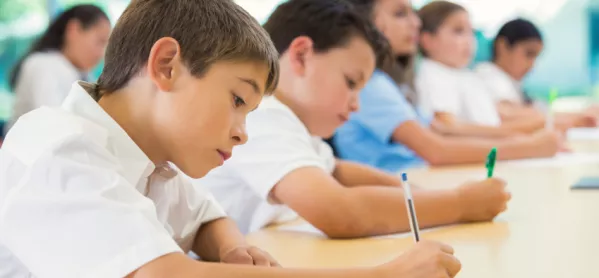More than one-third of people who trained to be Sats moderators did not pass their first training assessment, new figures reveal.
The information, obtained by Tes through freedom of information requests, shows that 937 (35 per cent) of the 2,705 would-be “pool” moderators who took the end-of-training test did not successfully complete it at their first attempt.
Moderators are used to ensure that the writing assessments carried out at the end of Year 6 are consistent across the country.
They do this by visiting primary schools in their local area each year to check that teachers’ assessments match a set of national criteria.
Following resits, at least one in eight of those who had hoped to be moderators this year were not approved - the same proportion as last year.
Quick read: When are 2019 Sats?
How to: How retrieval practice helped me to improve Sats results
Watch: Everything parents need to know about Sats
The pool moderators - who are normally teachers working in the local authority - were asked to judge three writing portfolios, and assess the children’s standard of writing in each case.
The figures show that 1,768 pool moderators correctly assessed all three portfolios at their first attempt, meaning that they were approved to moderate writing this year.
Sats: Flawed accountability?
Of those who were not approved at their first attempt, 890 successfully identified the standard of two of the portfolios, 41 got one right and six failed to correctly identify any.
Some of those who failed resat the training assessment with different portfolios, along with other moderators who were taking the assessment for the first time.
The figures show that there was a slightly higher pass rate (68.4 per cent) in the later assessment exercise.
After both rounds of assessments, 2,368 pool moderators - 87.5 per cent of those who had gone through the training - were approved.
Last year, a total of 2,322 pool moderators were approved.
Michael Tidd, headteacher of Medmerry Primary School In West Sussex, said: “The issue is the variability of the quality of the process.”
He pointed out that the figures show how difficult it is to be sure that judgements across the country are consistent - because even after training and two attempts at assessment, some moderators still fail to judge writing standards correctly.
“Only one in four schools gets a visit from a moderator,” Mr Tidd said. “A teacher doesn’t get training or a second attempt at assessing work. It seems to me we shouldn’t be using writing results for any type of accountability.
“We imagine there is a clear-cut line between children who reach the expected standard and those who do not, but there are thousands of children who are always going to be around that borderline.
“How do you decide if they are meeting enough of the writing criteria? We pretend there is a cut-off point but there is a massive grey area and there is always going to be. It is silly to pretend otherwise.”
In 2018, 78 per cent of pupils reached the expected standard in writing.
A Department for Education spokesperson said: “We publish guidance for local authority moderators and schools to ensure that teacher assessment is accurate and consistent.
“Local authority moderators take part in further teacher assessment training and standardisation exercises to ensure they meet the expected standard.”




